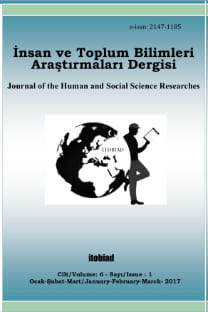Kaynaştırma eğitimi politikalarının değerlendirilmesine yönelik bir çalışma: Engelli öğrencilerin okul sorunları
Kaynaştırma eğitimi, normal özel eğitime ihtiyaç duyan öğrencilerin birlikte eğitim alma sürecidir. Kaynaştırma eğitiminin farklı boyutlarda incelenmesi politika belirlemek için önemlidir. Bu çalışmanın amacı, çocuğu devlet ilkokulları ve ortaokullarında kaynaştırma eğitimi alan velilere göre engelli öğrencilerin okul sorunlarını belirlemektir. Kaynaştırma eğitiminin sorunlarına yönelik veli görüşlerini belirlemeyi amaçlayan bu çalışmada nitel araştırma yöntemi kullanılmıştır. Çalışmada Kastamonu ili merkezi devlet ilkokullarında ve ortaokullarında kaynaştırma eğitimine devam eden öğrencilerin velilerinin görüşlerine başvurulmuştur. Kaynaştırma eğitimi alan öğrencilerin okul sorunlarını belirlemede okul sorunları; okul yöneticileri, öğretmenler ve arkadaşlar boyutu olarak ayrı ayrı incelenmiştir. Elde edilen bulgular genel olarak değerlendirildiğinde, kaynaştırma eğitimi alan öğrencilerin en fazla öğretmenlerle en az ise arkadaşlarıyla sorun yaşamaktadır. Çalışmanın bulgularına dayalı olarak araştırma ve uygulamalara yönelik öneriler, çalışma sonunda sunulmuştur.
Anahtar Kelimeler:
Kaynaştırma eğitimi, engelli öğrenci, okul
A Study on The Evaluation Of Inclusive Education Policies: School Problems of Students With Disabilities
Inclusive education is the process of education in which regular and special needs learners are brought together in the same academic environment and classroom for the purpose of learning. The investigation of inclusive education in different dimensions is important for policymaking. The aim of this study is to determine the school problems of students with disabilities attending inclusive classes in primary and secondary schools according to parents. The study was conducted based on the qualitative phenomenological research design, which attempts to describe the essence of experiences about a phenomenon. Participants of the research consist of 20 parents in Kastamonu city center. Students have problems with teachers, friends and school principals. They have more problems with teachers. Implications for further research and practice and implications of these findings for future reforms of inclusive education were discussed.
___
- Artiles, A. J., ve Kozleski, E. B. (2010). What counts as response to intervention in RTI? A sociocultural analysis. Psichotema, 22, 949-954.
- Kuyini, A.B. ve Desai, İ. (2009). Providing instruction to students with special needs in inclusive classrooms in Ghana : Issues and challenges. International Journal of Whole Schooling,5(2), 22 -39.
- Boyle, C., Scriven, B., Durning, S., ve Downes, C. (2011). Facilitating the learning of all students: The professional positive of inclusive practice in Australian primary schools. Support for Learning, 26(2), 72-78.
- Bryant, D. P., Smith, D. D., ve Bryant, B. R. (2008). Teaching students with special needs in inclusive classrooms. Boston, MA: Pearson Education, Inc.
- Bubpha, S., Erawan, P. ve Saihong, P. (2012). Model development for inclusive education management: Practical guidelines for inclusive schools. Journal of Education and Practice, 3(8), 223-233.
- Bunch, G. ve Valeo, A. (2004). Student attitudes toward peers with disabilities in inclusive and special education schools. Disability and Society, 19(1), 61-76.
- Burstein, N., Sears, S., Wilcoxen, A., Cabello, B., ve Spagna, M. (2004). Moving toward inclusive practices. Remedial & Special Education, 25(2), 104-116.
- Büyüköztürk, Ş. (2011). Bilimsel Araştırma Yöntemleri. Ankara: Pegem Akademi.
- Chow, V., ve Kasari, T. (1999). Task related interactions among teachers and exceptional at-risk typical learners in inclusive settings. Remedial and Special Education, 20, 226-232.
- Ekeh, U. ve Oladayo, T. (2013). Academic achievement of regular and special needs students in inclusive and non-inclusive classroom settings. European Scientific Journal, 9(8), 1857–7881.
- ISSN: 2147-1185
- Yayın Aralığı: Yılda 4 Sayı
- Başlangıç: 2012
- Yayıncı: Mustafa SÜLEYMAN ÖZCAN
Sayıdaki Diğer Makaleler
İnsan Getirdiği Problemler Bilimlerinde Olgu-Değer Ayrımının Meydana Getirdiği Problemler
Sanallasmanın Toplum Hayatına Etkileri
Kadir KESKİN, UFUK FATİH KÜÇÜKALİ
Mesleki Eğitime Erişim Yolu Olarak SODES (Sosyal Destek Programı) Projeleri
Refah Göstergeleri Bağlamında Türkiye’de İller Arası İç Göç Hareketlerinin Analizi
Sınıf Öğretmenlerin Perspektifinden Değerler Eğitiminin İncelenmesi: Erzurum Örneği
Hayrettin Ziya Taluy’un “Küçük Bir Gezginin Serüvenleri” Serisinde Anadolu’nun Temsili
Yaratıcı Kentler ve Kentsel Yetenek Üzerine Bir Tartışma
Dilek MEMİŞOĞLU, Gökhan KALAĞAN
İsra ve Miraç’ta Süleyman Mâbedi ve Mescid-i Aksa’nın Varlığı Meselesi
